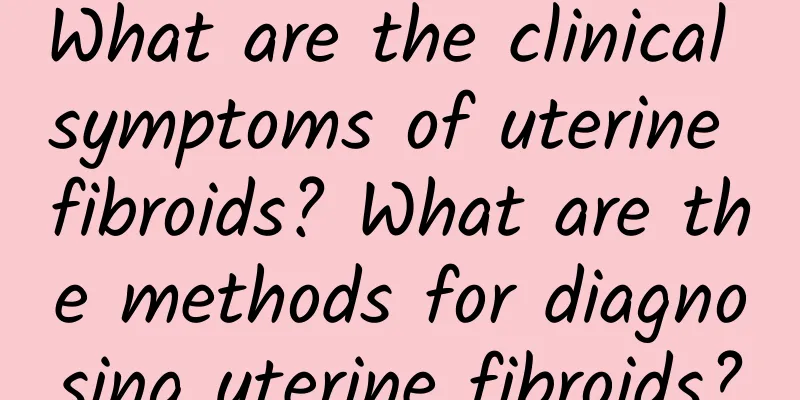What are the clinical symptoms of uterine fibroids? What are the methods for diagnosing uterine fibroids?

|
The rate of malignant transformation (i.e. sarcoma transformation) of uterine fibroids is very low, about 0.4-0.8%. However, we still need to be alert to the risk of malignant transformation. So, what is uterine fibroids? How to diagnose? Uterine fibroids are the most common benign tumors of the female reproductive organs, which are common in women under 30 to 50 years old and are rare. According to statistics, at least 20% of women of childbearing age suffer from uterine fibroids. Since most uterine fibroids have no more or less clinical symptoms, the incidence reported clinically is much lower than the actual incidence of fibroids. Diagnosis and identification: (1) The uterus becomes larger and softer during pregnancy. Threatened abortion often manifests as irregular bleeding, which may be confused with cystic changes in uterine fibroids during physical examination. However, pregnant women have a history of menopause and early pregnancy reactions, and the uterus becomes softer with menopause. With the help of urine or blood β-HCG measurement and B-ultrasound diagnosis. (2) Ovarian tumors Ovarian tumors sometimes also cause compression symptoms such as frequent urination and constipation, and abdominal masses. However, most ovarian tumors do not have menstrual changes, and most masses are located on one side of the uterus. However, attention should be paid to the identification of solid ovarian tumors (especially sex cord stromal tumors that can cause changes in hormone levels and abnormal uterine bleeding) and subserosal uterine fibroids. B-ultrasound can be used to assist in diagnosis, such as laparoscopy. There are many drugs for treating uterine fibroids, and the following are commonly used. You may wish to consult Kangai and then choose the appropriate treatment for the disease: Guizhi Fuling Capsule: Suitable for endometriosis, chronic pelvic inflammatory disease, uterine fibroids, dysmenorrhea, amenorrhea, ovarian cysts, breast hyperplasia, prostatic hyperplasia, urology, breast surgery. Dangui Capsule: Suitable for uterine fibroids, pelvic inflammatory disease, obstetrics and gynecology. Xiaojie'an Capsule: Used for breast lumps caused by qi stagnation and blood stasis, breast lobular hyperplasia, ovarian cysts, and uterine fibroids. |
<<: Are uterine fibroids benign tumors? What are the symptoms of uterine fibroids?
>>: What is uterine fibroids? What is the cause of uterine fibroids?
Recommend
Break through the weight loss wall! IG slimming queen did it with this trick
If you have always been chubby and people call yo...
What are the effects of baking soda on the vagina? It must be used under the guidance of a doctor
The main therapeutic effects of baking soda on th...
How to satisfy yourself during menstruation
During menstruation, satisfying yourself is not o...
Symptoms of acute pelvic inflammatory disease that women should pay attention to
Female pelvic inflammatory disease is divided int...
Causes of cervical hypertrophy in life
Among the many diseases of the cervix, cervical h...
Which hospitals in China are the best for treating pelvic effusion?
In life, many female friends are troubled by pelv...
There are several categories of abnormal leucorrhea
Abnormal leucorrhea can be divided into two categ...
Taking sugar-removing drugs to lower blood sugar, fasting to lose weight and a big belly, actually led to ketoacidosis!
In recent years, the number of people taking suga...
What are the dangers of ectopic pregnancy
At present, there are many women suffering from e...
Analyze the symptoms of adnexitis for you
Many women suffer from adnexitis due to various f...
Causes of uterine effusion
Gynecological diseases are a common disease among...
Chemotherapy for ectopic pregnancy
Chemotherapy for ectopic pregnancy is a new minim...
What situations constitute the dangers of cervical erosion?
What are the hazards of cervical erosion? Many pa...
The most important preventive measures for dysmenorrhea in life
Dysmenorrhea is common in life. Doing a good job ...
What to do if you are pregnant with uterine fibroids
Uterine fibroids can coexist with pregnancy, and ...









